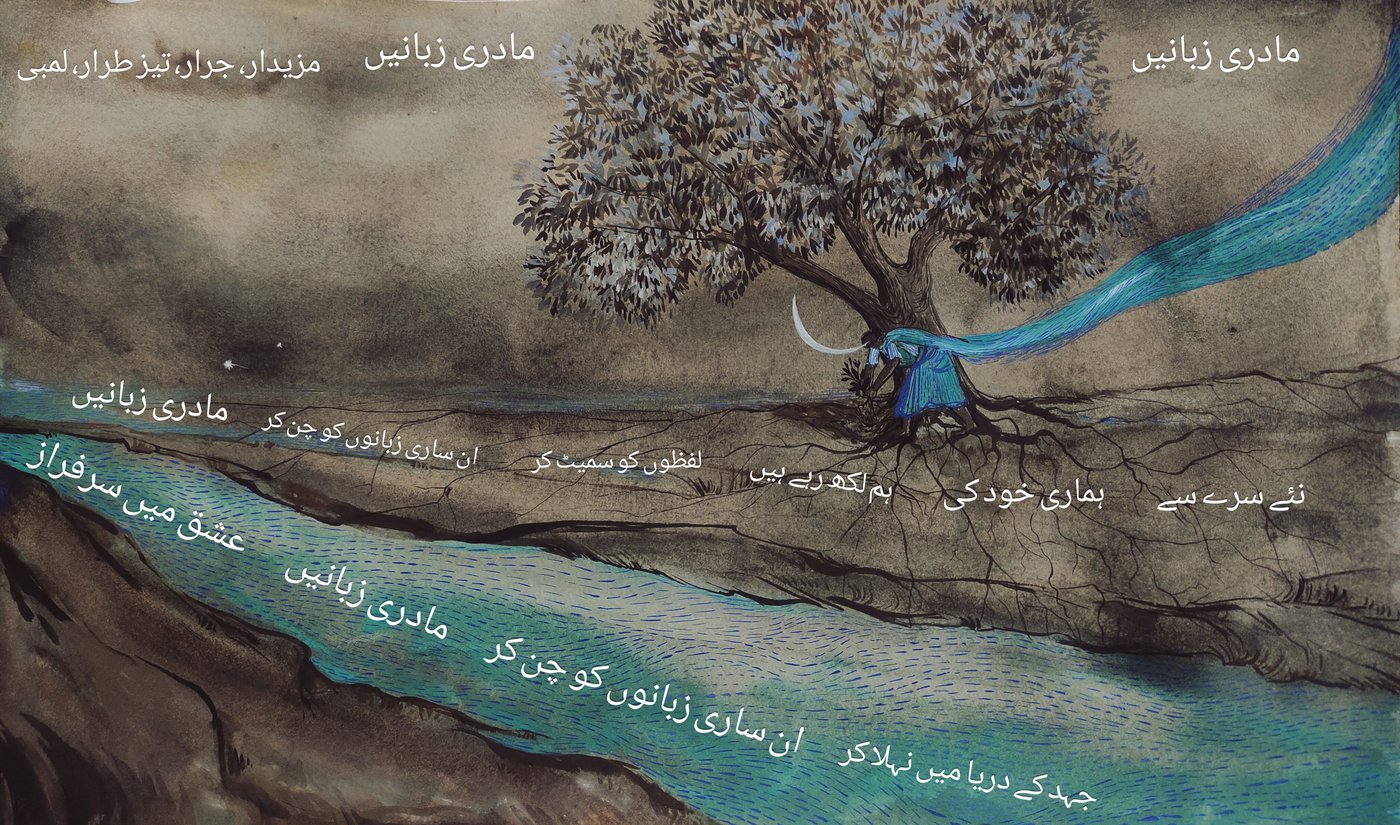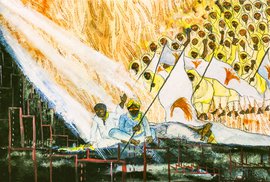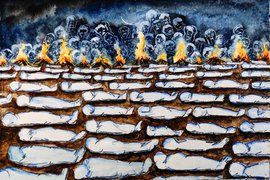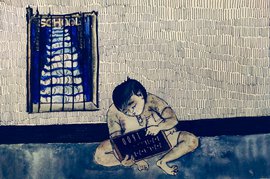She was stitching away rapidly, pinning her flying rage onto the kantha coverlet. She had learnt the stitch from her grandmother. As a child she had watched, with utter fascination, the magic of grandma's wrinkled fingers turn rags – little soft pieces of old dhotis , cotton sarees , worn out kameez collected over time – into finely embroidered quilts. It was one such piece done by grandma that came with her dowry when she got married. A safety blanket she held on to, ever more tightly, on troubled cold nights. But it was when she started stitching a coverlet of her own that she felt closest to Naani jaan . It was as if she had learnt to speak her language. It was not imagination, or blasphemy, or rebellion that guided her needle. She came alive at its tip, she loved and spoke with the thread, lived in the patterns it created. She roamed freely inside the stitches, and motifs. She dreamt and parrots flew on the pale white, the splendour of their wings red, orange, green dyed the flower vines next to it. Her anger glistened on the thin, sharp edges of the leaves; resentments deepened the densely stitched centres of flowers. The fish, horses, elephants, and bees marched to the rhythm of her untold stories.
مادری زبانیں
شاید نہ میری
اور نہ ہماری ماں کی کوئی زبان تھی
زبان تو مردوں کوملتی ہے
مردانیت کی وراثت میں
جس کو وہ جیسے چاہیں استعمال کر سکتے ہیں،
گالیاں ایجاد کرکے
غصہ کر،
قانون بنا کر،
چلاّ کر
کھوکھلے عشق کے خطوں میں،
دیواریں گود کر،
تاریخیں گڑھ کر
مردوں کی زبانیں ملتی ہیں
دفتی کی لغتوں میں
اس کو چھاپنے کے لیے
مشینوں کا ایجاد ہوا ہے
ماں کی زبانوں میں لکھی
کویتاؤں کےنیچے
خود کا نام گُدا ہے
بڑے بڑے کتاب گھروں میں
ان کی زبانوں کی ہی کتابیں اور میگزینوں کی
لمبی دھول بھری، جالا لگی الماریاں موجود ہیں
پارلیامنٹوں میں، ریلیوں میں
مردوں کی زبانیں ہی
بولی گئی ہیں
سنی گئی ہیں
لکھی گئی ہیں
سمجھی گئی ہیں
اشتہاروں میں چھاپی گئی ہیں
ہماری ماؤں کی زبانوں کی
تصویر و تاثیر الگ
انداز الگ
تاریخ الگ
بھاؤ الگ
باریک الگ
ڈبو کے عشق میں
بھگو کے لوبان کی دھونیوں میں
جہد کے دریا میں نہلا کر
مٹی کے قلم تیار کیے گئے ہیں
پھر چھپا کر انہیں رکھا گیا ہے
ساڑیوں کی پرتوں میں
ٹرنک میں دبا کر
انوکول موقعوں پر نکال کر
خون کی سیاہی سے ہتھیلیوں پر
مٹی کے قلم نے لکھی ہیں
ہماری مادری زبانیں
جب جب قلم بنا نہ سکیں
تو، بند کمروں کے کونوں میں
رانیوں نے، داسیوں نے
پھسپھسائی ہیں ہماری مادری زبانیں
جنہیں کمرے اور محل نہیں ملے
انہوں نے کھیتوں
اور جھونپڑیوں کی کچی زمینوں پر
ہنسیے اور کھرپیوں سے گودی ہیں
ہماری مادری زبانیں
جن کے ہاتھوں میں فن تھا انہوں نے
برقعوں اور ساڑیوں پر کاڑھی ہیں
آری، زردوزی و مقیش کی
مادری زبانیں
قبروں کی اینٹوں پر گدی
مادری زبانیں
چتاؤں کی راکھ میں بجھی
مادری زبانیں
خوابیدہ پلکوں سےکھلے لال آسمان پر لکھی
مادری زبانیں
آندولنوں کی گلابی پکار
مادری زبانیں
دلوں کی دھڑک، عشق کی جھنکار
مادری زبانیں
تمنا کی طلب گار
مادری زبانیں
مردوں کی زبانوں کا
رنگ ایک
طریقہ ایک
آواز ایک
مگر رنگ برنگی اٹھلاتی
رس دار، نانا پرکار
مادری زبانیں
اختری کے حلق سے گرے الفاظ
فاطمہ کا انداز
عشق میں سرفراز
مادری زبانیں
ان ساری زبانوں کو چن کر
لفظوں کو سمیٹ کر
ہم لکھ رہے ہیں
نئے سرے سے
ہماری خود کی
مزیدار، جرار، تیز طرار، لمبی
مادری زبانیں
Mothers’ tongues
Perhaps, neither my mother nor I
ever had a tongue
Men are gifted with tongues.
A masculine heritage
that they can wield as they wish,
to invent slurs,
to spit anger,
to dictate laws,
to scream,
to write hollow love letters,
to engrave walls,
to forge histories.
Tongues of men are
wrapped in hardbound dictionaries.
Machines have been invented
to print them.
Their names have been imprinted
under the lines of poems
written by our mothers.
Their books written in their tongues
lie wrapped in cobwebs
on the dust laden shelves of big libraries.
Be the parliaments or the rallies
it is their tongue that is
spoken
heard
documented
written
understood
advertised.
Our mothers’ tongues are different –
their impression
their impact
their style
their history
their performance.
They have carved their pens out this earth
dipped them in love,
drenched in the mystic smoke of the Loban
washed them in the oceans of sweat
and kept them hidden
between the folds of old sarees
at the bottom of a trunk, safe.
It is these earthen pens that have,
at some ripe moment,
written on our palms, in bloodied ink
our mother tongues.
And when they could not craft the pens,
behind the closed doors of the room
they whispered our mother tongues,
the queens, the slave women.
And those who had no rooms, or castles
etched with sickles and trowels,
on the mud-covered earth in their fields,
on the floors of their huts
our mother tongues.
Those with skills at their fingertips
have embroidered on abayas and sarees
our mother tongues
of
aari, mukaish
, and
zardozi
Our mother tongues –
inscribed on the gravestones
burnt to ashes in the flames of the pyres
written on the red sky
opening inside the dream-filled, sleepy eyes.
Our mother tongues –
the crimson call of revolutions
the beating of our hearts
the music of love
the restless desires.
Our mother tongues!
The tongues of men are all the same
same colours
same patterns
same sounds,
unlike these
swaggering in many hues, diverse,
melodious tongues of our mothers.
Our mother tongues,
like the words that came from Akhtari’s throat
like the ways learnt from Fatima
like the pinnacle of love.
Plucking each one of them
gathering all the words
we are now writing
a new beginning,
in our own exciting, brave,
argute, sharp-witted,
long mother tongues.
Translated from Urdu by Pratishtha Pandya.



